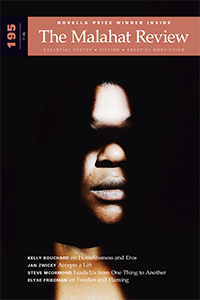Issues
Our Back Pages
Issue #195
Issue Date: July 2016
Editors: John Barton
Pages: 128
Number of contributors: 25
Buy Issue 195: Print Edition

Binaries, real and perceived, pervade this summer issue of The Malahat Review. The works inside take pain and pleasure in equal measure, deconstructing the tired conventions of man/woman, self/other, and desire/duty, among others. The stunning chiaroscuro of thecover image, Nina Robinson’s Self as Self, in which a column of light illuminates the forehead, nose, mouth, and chest of a figure emerging from the dark, signals the coming contrasts. Former Canadian Poet Laureate George Elliott Clarke’s “Othello: By Donatien Alphonse François, Marquis de Sade” and its companion painting, Lara Martina’s “Gold is the silver lining of Adultery,” illustrate the theme of division perfectly. Both wildly titillating and viscerally unsettling, Clarke’s poem employs a plurality of registers for its unabashed disclosure of the social, racial, and sexual tensions of great literature’s repressed voices; as he puts it, “My beautiful crime / will be to furnish tarnish / to beautiful imaginings— / via my gutter mutterings.”
Following the example of fearless expression set by the above artists are three poems by Rebecca Păpucaru that reflect on image and desire. Păpucaru’s tone, vulnerable yet firm in its honesty, challenges a skewed sexual power structure that survives on women’s silence and acquiescence. Patricia Young’s “Venus of Urbino” likewise reclaims the spectator’s gaze to protest male-dominated conventions of desire in art through ekphrastic speaking back, and Sue Chenette’s “Self-portrait with Wasps” bites into the issue of social expectations versus personal fulfillment. Confronting a similarly contentious topic, Jan Zwicky’s “In Winter” recalls an encounter in which a young man’s act of unsolicited and uncommon kindness complicates the left-versus-right political binary and humanizes the conservative other.
At the centre of this issue is Anne Marie Todkill’s Novella-Prize-winning short story “Next of Kin,” a meditation on the crisis of empathy experienced by a daughter constructed by others as caretaker and mediator, as an eternally loyal and selfless type. Enduring deaths in the family, her mother and sister’s constant derision, and the crocodile tears of her sister’s manipulative ex-lover, Marian struggles to realize a desire and agency uniquely her own. In “Hector’s Last Stand,” a short story scaffolded around the brilliant conceit of a four-week dating-app binge, Matthew Harris plays the field of internal longing and outside acknowledgment. Each piece of the story’s sequence bleeds into the next, as names, phrases, intimate details, and narrative set pieces are recycled to emulate the protagonist’s mind-bending descent as the memory of his beloved fades in a hedonistic haze.
This issue’s creative nonfiction also deals with divided lives. In “Women and Children,” Kelly Bouchard offers a frank reevaluation of masculine identity in which he recounts living at a binary-gender-segregated shelter that perpetuated a discourse of shame and mistrust for those it served. Francine Cunningham’s “Still, Small Voice” similarly works through the deadlock of living with a hereditary mental illness that creates a fissure between innate, felt truth and rational understanding. Flip to the back of the issue for reviews of featured poet Ruth Roach Pierson’s Realignment, former Saskatchewan poet laureate Robert Currie’s The Days Run Away, and more.
—Chris Horne









